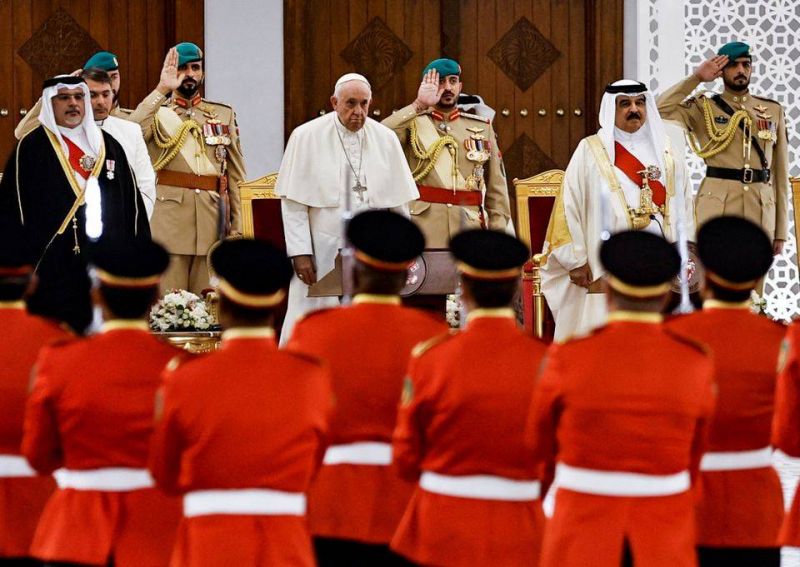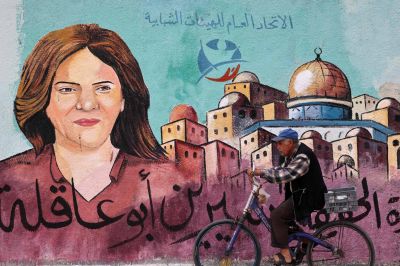
Pope Francis, Bahrain's Crown Prince and Prime Minister Salman bin Hamad Al Khalifa and King Hamad bin Isa Al Khalifa stand at Sakhir Palace, south of Manama, Bahrain, November 3, 2022. (Credit: Hamad L/ Reuters)
SAKHIR — Pope Francis spoke out against the death penalty on Thursday at the start of a trip to Bahrain, where the Shiite opposition accuse the Sunni monarchy of overseeing human rights abuses.
The pontiff's visit, only the second by a pope to the Arabian Peninsula, is aimed at improving ties with the Islamic world but thrust him into the Sunni-Shiite rights divide in Bahrain, which crushed a pro-democracy uprising in 2011.
Referring to Bahrain's constitution, Pope Francis said commitments should constantly be practiced so that "religious freedom will be complete," equal dignity and equal opportunities "concretely recognized for each group," that no forms of discrimination exist and that human rights "are not violated."
"The right to life [and the] need to guarantee that right always, including for those being punished, whose lives should not be taken," he added.
Pope Francis was speaking at Sakhir Palace alongside King Hamad bin Isa Al Khalifa. From the stage, the 85-year-old pope, suffering from knee pain, was led in a wheelchair to the entrance of the courtyard with the king walking alongside. The pope rose and the two embraced before the pontiff got into a white Fiat 500 with Vatican plates.
 Pope Francis leaves the Royal Palace in the capital Manama on November 3, 2022. (Credit: Marco BERTORELLO / AFP)
Pope Francis leaves the Royal Palace in the capital Manama on November 3, 2022. (Credit: Marco BERTORELLO / AFP)
King Hamad, in his speech, said his country protected the freedom of all faiths to "perform their rituals and establish their places of worship." Bahrain, he said, rejected religious discrimination and condemned "violence and incitement" under a declaration issued by the state several years ago.
The Gulf state seeks to strengthen "our common purpose towards a world in which tolerance prevails while striving for peace, and rejects whatever divides its unity and threatens its civilizational development," he added.
"Historic moment"
The pope's visit has drawn attention to tensions between the Sunni-led government and the Shiite community that led a sizeable pro-democracy uprising in the 2011 Arab Spring, which Bahrain quashed with Saudi and UAE help.
Bahrain has imprisoned thousands of protesters, journalists and activists - some in mass trials - since the uprising and cracked down on later dissent and sporadic unrest, in which security forces were targeted by bomb attacks.
Sayed Ahmed Alwadaei, a Bahraini activist in exile who heads the Bahrain Institute for Rights and Democracy, in a statement praised the pope's speech as a "historic moment" and urged King Hamad to release those "wrongly imprisoned so the country can finally begin to heal after years of violence and oppression".
Families of death row inmates in Bahrain appealed to the Argentina-born pope to speak out against capital punishment and defend political prisoners during his trip.
Bahrain rejects criticism from the United Nations and others over its conduct of trials and detention conditions. It says it prosecutes in accordance with international law and that its legal and judicial system continues to be reformed.
During the Nov. 3-6 trip, Francis will address the "Bahrain Forum for Dialogue: East and West for Human Coexistence," hold talks with King Hamad and meet the Muslim Council of Elders.
In 2019, Pope Francis visited the United Arab Emirates which, along with Bahrain, forged ties with Israel under the Abraham Accords in 2020.
Bahrain is about 70 percent Muslim and, unlike Saudi Arabia, allows its community of about 160,000 Catholics — made up mostly of foreign workers — to practice their faith publicly in two churches.
It is home to the first modern-built Catholic church to be built in the Gulf, as well as the cathedral of Our Lady of Arabia— the largest Catholic church on the Arabian Peninsula.
Additional reporting contributed by Ghaida Ghantous in Dubai.
